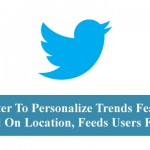 Mountain View, California — Silicon Valley tech titans Google, Facebook, Twitter and other big web firms are forging fresh alliance with the nonprofit website StopBadware, which focuses on protecting consumers from sites that lead to viruses, spyware and other malware by forming the Ads Integrity Alliance, in a powerful bid to counter so-called bad ads and work to create trust within the online advertising industry.
Mountain View, California — Silicon Valley tech titans Google, Facebook, Twitter and other big web firms are forging fresh alliance with the nonprofit website StopBadware, which focuses on protecting consumers from sites that lead to viruses, spyware and other malware by forming the Ads Integrity Alliance, in a powerful bid to counter so-called bad ads and work to create trust within the online advertising industry.
The group, which is dubbed as Ads Integrity Alliance, which will be headed by Maxim Weinstein, executive director of StopBadware, and also includes AOL.com and the Interactive Advertising Bureau among its founders, will allow members to share information on the latest types of attacks and fraud as well as best practices for defeating attackers’ attempts to spread malware and sell fraudulent goods through online advertisements.
Commenting on the joint effort, the company executive said, “No individual business or law enforcement agency can single-handedly eliminate these bad actors from the entire web,” Eric Davis, Google’s global public policy manager said in a blog post last week.
“All complex ecosystems have parasites,” said Google’s Davis. “The best way to tackle common problems across a highly interconnected Web, and to move the whole Web forward, is for the industry to work together, build best practices and systems, and make information-sharing simple.”
Essentially, Ad serving systems are devised to cater to millions of targeted ads on Web sites in a scalable way, which makes it difficult to capture every bad ad before it hits the Net, according to Weinstein.
Online advertisements spreading malware, known as “malvertisments,” are one of the toughest threats to detect, because the malicious ad may only pop-up occasionally on any particular site. More than six out of every 10 sites hosting malware are not fake fronts on the Web, but legitimate sites that have been compromised or hosting malvertisements, according to Symantec’s Norton Safe Web service.
Last year alone, for instance, Google deactivated around 130 million ads and more than 800,000 advertisers that violated policies on its sites and those of its partners’ sites, Davis wrote in a post on the Google Official blog.
Besides, the problem is that when Google or any another website shuts down a bad actor, that scammer often simply attempts to advertise elsewhere, said Davis, while emphasizing the need for an industry-wide effort.
Both Google and Facebook expressed their confidence in the new partnership.
More so, “When you have really large scale automated systems and you also have a criminal element that wants to take advantage of that to deliver malware and commit fraud you need to find ways to balance the need for efficiency and automation with the need to protect users from bad ads,” Weinstein said. “That has to include some combination of automation and human intervention.”
In fact, the charter members will share information about scams and malware in advertising and develop policy recommendations and best practices, as well as work to inform consumers and policymakers about the threat, Weinstein said. “Having formal channels for sharing information about specific threats, trends and bad actors can be a valuable weapon” in stopping criminals and scammers as they move their campaigns to different sites on the Web, Weinstein he said.
On the other hand, the security problem posed by advertisements is not easy to solve, but the alliance should be able to help companies focus on the best methods to defeat criminals and fraudsters, says Weinstein.
“It is about managing the problem effectively,” he says. “It is esentially important that ads that are carrying malware and these other types of bad ads are intercepted by the companies that are carrying the ads before they get to the user’s desktop.”
Especially, not present at the group is Microsoft and Yahoo. Weinstein said he hopes those companies will soon become members in the future as the alliance expands. “We decided to try to move fairly quickly on pulling [the Alliance] together and get something up and launched,” he said.


